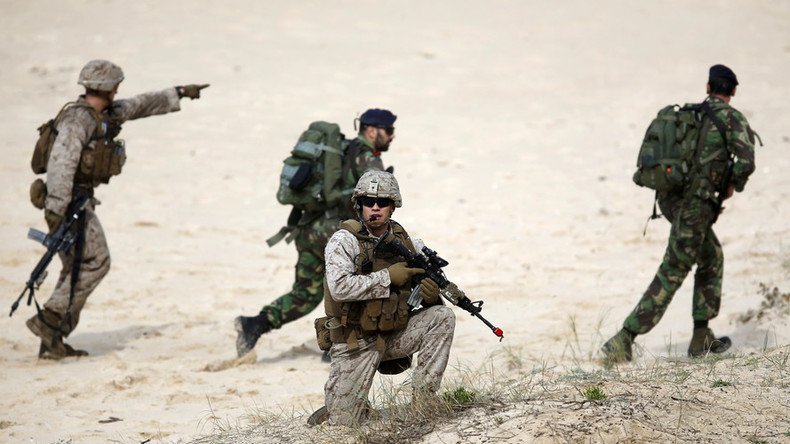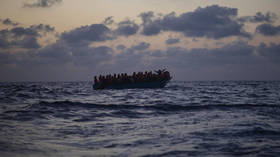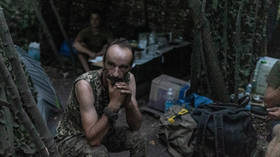Getting intervention 'just right': The West's Goldilocks strategy in Libya

A renewed Western military ‘commitment’ to Libya will not be enough to defeat ISIS – but it might be enough to establish the permanent military presence in North Africa the West has been hankering after ever since 1970.
On 19th February, the US launched an airstrike on an ISIS training camp in Sabratha, Libya, killing an estimated 40 people. While the attack was widely reported as a ‘new front’ in the West’s ‘war on terror’, the reality is that the Western military presence inside Libya has been growing for some time.
As an Oxford Research Group paper published last month noted, “US, British and French special operations forces are operating covertly with local allies across northern Libya and their aircraft fly quite openly on reconnaissance missions in Libyan airspace. US F-15E strike aircraft, operating from the UK, have launched ‘targeted killing’ attacks on alleged jihadist leaders and US commandos have abducted at least two others for trial in the US. In February Italy approved the use by US armed drones of its Sigonella air base in eastern Sicily, albeit with tight restrictions”.
The paper added that all of this is in addition to the EU’s “Italian-commanded EUNAVFOR MED naval force with a ludicrous mission and no UN mandate” that was launched last October.
Libya may become ‘failed state’ if conflict continues - Kerry [VIDEO]https://t.co/dqQ3U5VKOU
— RT America (@RT_America) February 26, 2016
Meanwhile, preparations are well underway for a major escalation. The US government is considering“airstrikes, commando raids or advising vetted Libyan militias on the ground, as Special Operations forces are doing now in eastern Syria. Covert CIA paramilitary missions are also being considered”, as are “teams of commandos to work with Libyan fighters” in what would “most likely be a Special Operations war”.
Italy has ordered the deployment of four AMX fighter aircraft and one Predator drone to its Birgi base near Trapani, Sicily, as part of its preparations for a new Libya intervention, and British military figures have announced that “US and British Special Forces were in Libya gathering intelligence to prepare for a possible deployment of up to 6,000 US and European troops”.
While the impact of such an escalation is hotly debated, what is not in doubt amongst serious analysts is that it will fail to defeat ISIS. Indeed, even the US military admit this, with chairman of the Joint Chiefs of Staff Joseph Dunford explaining that the aim would be “to contain or disrupt” ISIS – not, that is, to defeat them – and certainly not to end the civil war and political violence that NATO’s destruction ignited in 2011.
Even this modest goal is unlikely to be met, however. As Mattia Toaldo, a senior policy fellow at ECFR writing for the journal Foreign Policy, explains: “This intervention is not radically different from other, limited campaigns Washington has undertaken, such as its offensive against Al Qaeda in Yemen. The focus of these attacks is always on the terrorist organization themselves, rather than on the countries in which they are based. Drones, air strikes, and special operations may be a cure for a specific disease, but they do not make any attempt to treat the patient. In other words, this is about the Islamic State, not about Libya. And that is why this approach is simply not enough. In order for a military response to work, it must be backed by a political strategy — which, so far, Western policymakers have completely failed to articulate.”
DoD, State Dept. justifies Libya strike legality w/15yo authorization, some intl lawhttps://t.co/gRwzvxOXh1pic.twitter.com/0d0CkcMbxk
— RT America (@RT_America) February 20, 2016
The Oxford Research Group paper succinctly sums up the likely results of the West’s proposed escalation: “while it would not be difficult to displace IS from central Libya, such attacks risk rallying many more Libyans to IS, shifting militants to other parts of Libya or the Sahel-Sahara, and would probably exacerbate the existing conflict between armed factions for control of the Libyan state and its resources. As in Syria, it does not answer the question of who would hold and govern any territory regained from IS.”
Let us take stock of these arguments. In the absence of a viable political entity to take over territory reclaimed from ISIS, the military strategy on the table is likely only to a.) increase political violence between other factions, b.) create perfect recruitment conditions for ISIS,and c.) encourage ISIS to fan out across the country and the region. But Western governments hardly need a ‘think tank’ to tell them that, let alone a crystal ball. A basic memory function would suffice: for using military force to create power vacuums, civil war and terrorist recruitment is exactly what the US and Britain have been doing across the region for the past fifteen years.
In the process, however, they are of course creating a market for their services. Destabilized countries quickly become dependent on military support from their ‘international backers’, and are unable to build up enough of a functioning economy to genuinely act as independent, sovereign nations.
The next phase of the West’s recolonization of Libya, then, is the insertion of military forces whose very presence reproduces the conditions justifying that presence. This process may well lead the US and Britain to establish what they have only been able to dream of since Colonel Gaddafi evicted their airbases – the biggest in Africa at the time – from Libyan soil in 1970: a permanent bridgehead for the projection of military power across the African continent.
The US African Command (AFRICOM) has already insinuated itself in Chad, Nigeria and Cameroon, as a direct result of the fallout from the Libyan war of 2011, and Libya was highlighted in its strategy document last autumn as one of the Command’s ‘five lines of effort’ for the next five years.
AFRICOM, it should be noted, was effectively conceived by the African Oil Policy Initiative Group – made up of military officers, energy lobbyists and members of the US Congress – in their 2002 white paper “African oil: A Priority for US National Security and African Development”. This paper noted that “The Gulf of Guinea, as part of the Atlantic oil-bearing basin, surpasses the Persian Gulf in oil supplies to the US by 2:1” and recommended “a new and vigorous focus on US military cooperation in sub-Saharan Africa, to include design of a sub-unified command structure which could produce significant dividends in the protection of US investments”, adding that “failure to address the issue of focusing and maximizing US diplomatic and military command organization …could…act as an inadvertent inventive for US rivals such as China [and] adversaries such as Libya…to secure political, diplomatic, and economic presence in parts of Africa.”
In short, the best way to fight against Chinese and Libyan investment in Africa was through military force. And the ‘war on terror’ has turned out to be a great means of projecting that force – regardless of the fact that it was NATO that created the terror threat in the first place.
The Western intervention currently underway in Libya, then, as well as its proposed escalation, is enough to exacerbate the underlying instability in the country, but not so much of a commitment as to actually have any prospect of defeating ISIS. For US and British strategic purposes, then, like Goldilocks’ (stolen) bowl of porridge, it is ‘just right’.
The story of Goldilocks, however, was not originally meant to be a tale about discovering what is ‘just right’ - it was supposed to be a moral fable warning of the dangers of wandering into another’s territory and stealing and breaking their property. But over time, this aspect of the story – of what the heck Goldilocks was doing there in the first place - has, it seems, been entirely lost. In the same manner, the humanitarian imperialists prefer us not to consider the basic lesson of the invasion of Libya (as of Iraq, Afghanistan and Vietnam) - that is, not to wander into another’s territory and break and steal their property – but rather on how to make such invasions ‘just right’.
The problem, as ever, is that what is ‘just right’ for the ‘Empire of Chaos’ is diametrically opposed to the needs of the population. No wonder Libyans are not rushing to welcome yet more of the West’s tomahawk and hellfire salvation.
The statements, views and opinions expressed in this column are solely those of the author and do not necessarily represent those of RT.














